AI Engineer Revives Father's Handcrafted Shuttlecock Business and Achieves Rs 50 lakh turnover

Partho Burman
| Kolkata
11-April-2025
Vol 16 | Issue 15
By day, 32-year-old Adrish Maity is an AI engineer working remotely for a US-based multinational company. But beyond his tech career, he is also the proud force behind Shuttlex, a homegrown shuttlecock brand that clocked a turnover of Rs. 50 lakh this fiscal year.
Running the business from a small workshop nestled inside his family’s modest home in Uluberia, near Kolkata, Adrish is carrying forward the legacy of his late father, Naba Kumar Maity—a man who once handcrafted shuttlecocks in silence, with little fanfare, but immense dedication.
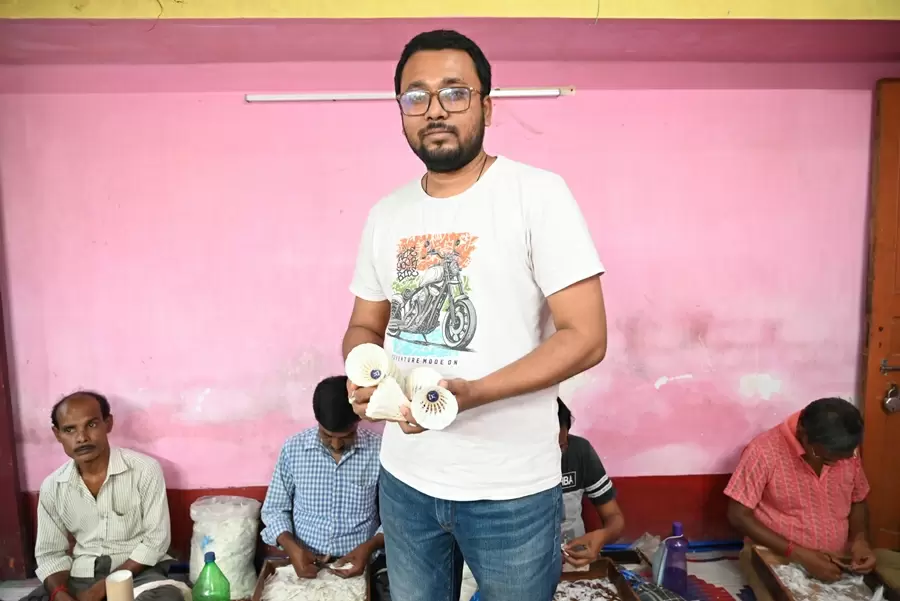
| Adrish blends modern tech with traditional craftsmanship to develop his father's shuttlecock business (Photos: Special Arrangement) |
“I grew up watching my father put his heart and soul into making quality shuttlecocks, even as the business barely scraped by,” says Adrish, who now manages the company’s operations alongside his day job.
“What I witnessed as a youngster hasn’t changed,” says Adrish, glancing around the familiar space. “The 10x15-foot room on the ground floor still serves as the workshop—only a few things have changed.”
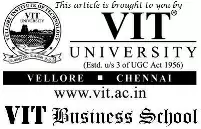
The same craftsmen his father once hired continue to work, their hands as steady and skilled as ever. But the heart of the home feels different now.
“This house is missing my father, who died at 65,” Adrish says softly. “He expanded the house by two floors over the years. The workshop was his life. He struggled for 55 years - from the age of 10.”
Adrish pauses, his voice filled with admiration and a tinge of sorrow. “He worked tirelessly to build the company. However, his lack of education had been a hurdle. Language barriers prevented him from doing effective marketing. There may have been other challenges too, but he chose not to speak about them.”
Naba Kumar’s journey was one of sheer grit. A skilled feather cutter, he had once worked with D.B. Pandit & Co., a well-known shuttlecock manufacturer. In 1986, determined to build something of his own, he launched N.K. Maity & Co. in Baniban village with just Rs. 5,000 in hand.
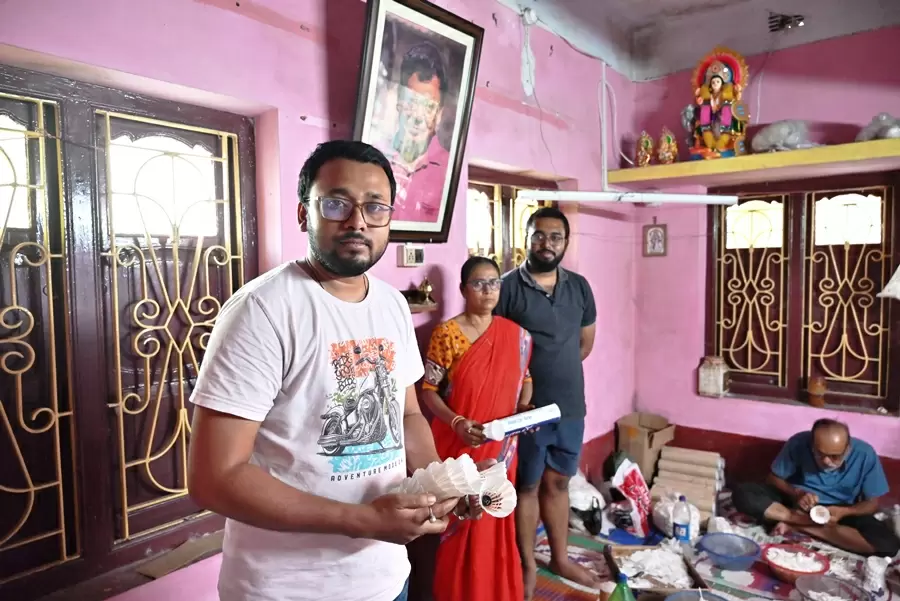
| Adrish with his mother Krishna Maity, who oversees packing, and younger brother Aniket Maity, a TCS engineer |
Using only white duck feathers of the finest quality, he began handcrafting shuttlecocks. Initially, he worked alone, but a year later, he hired a few labourers and steadied the business.
“My father had suffered greatly in his earlier years,” Adrish shares. “At the age of 10, he lost his father—my grandfather. He couldn’t even complete his primary education. By 12, he had to join D.B. Pandit & Co. as a daily wage earner to support the family. My father and his elder brother, who worked in jute mills, were the breadwinners for a family of 10 members.”
Despite the hardships, Naba Kumar remained committed to his craft. In 1990, he married Krishna Maity, and together they began building a life around the small business. By 1997, they moved their operations and residence from Baniban to Jadurberia in Uluberia, where the workshop continued in a small corner of their new home.
While his father struggled to scale up, Adrish took a different path. After completing his B.Tech from Kolaghat Engineering College in 2013, he joined TCS and worked there for four years.
“I quit TCS in 2018 and later pursued a master’s degree in artificial intelligence,” he explains. “The first part of the course was at IIIT Bangalore, and the second part was at Liverpool John Moores University in England. Since the COVID pandemic closed everything, I completed the course online. That allowed me to stay home and supervise our production activities at the same time.”
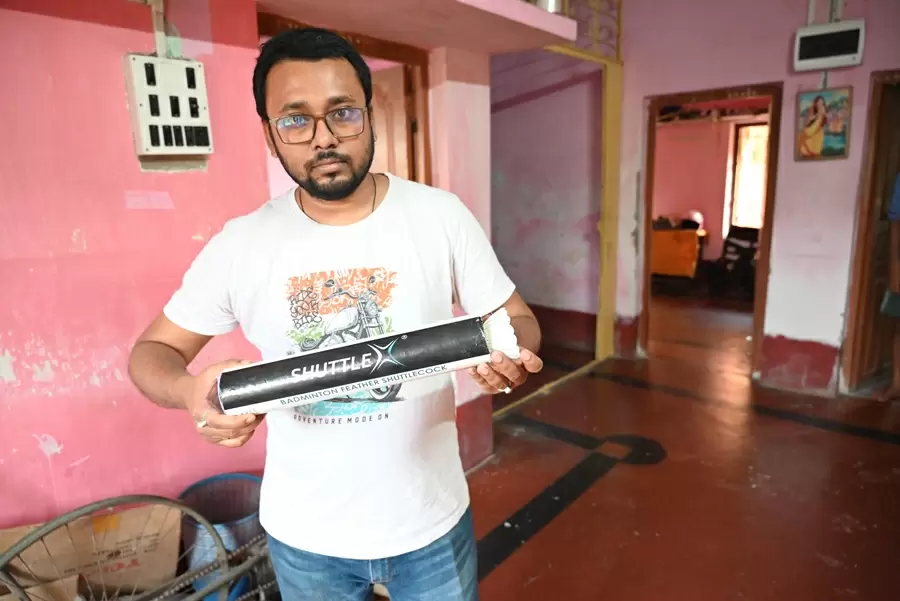
| With zero ad spend and smart digital marketing, Adrish has built Shuttlex’s online presence |
In 2021, Adrish joined his current company as an AI engineer. But his focus wasn’t just on algorithms and data. “My father, who passed away this January, couldn’t market his brand—Wing—due to many reasons,” he shares. “In order to have an online presence that helps build more visibility and generates a customer base, I created a website.”
He rebranded the business as Shuttlex, invested Rs. 5 lakh, and started applying his digital marketing skills. “We are getting bulk orders, but we don’t sell directly online. We receive inbound inquiries via our website, email and WhatsApp for bulk offline sales,” he says. “We are planning to launch an e-commerce platform soon.”
With zero spending on advertising, Shuttlex is gaining momentum. The company clocked Rs. 25 lakh turnover in 2022-23, Rs. 30 lakh in 2023-24, and touched Rs. 50 lakh this fiscal year.
Each shuttlecock is a product of careful handcrafting—16 overlapping white duck feathers, bound with cotton and nylon threads, glued onto a cork base. About 90% of feather shuttlecocks are handmade.
Adrish explains, “Our top-quality shuttlecocks cost Rs. 650 per box to make. We sell them wholesale at Rs. 700, and in the retail market, they are priced between Rs. 800 and Rs. 850.”
Every day, 10 skilled workers craft around 500 shuttlecocks. In a year, they produce nearly 1,82,500 units. The company supplies to clubs in Kolkata, and to customers in Mizoram, Nagaland, Chennai, and Pondicherry. Some boxes are even sold without branding, letting local retailers market them under their own names.
But the business is not without challenges. The biggest hurdle is sourcing raw materials—duck feathers. “They are not sold in kilograms, but in pieces. A single feather costs Rs. 2 to Rs. 2.25,” says Adrish. “Some suppliers are hoarding feathers, creating artificial scarcity.”
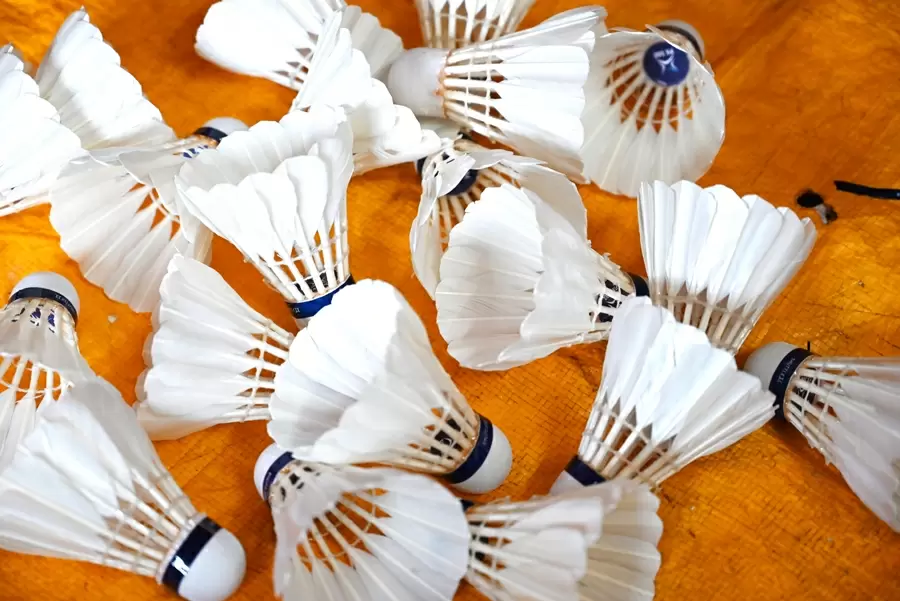
| Each Shuttlex shuttlecock is handcrafted with precision using white duck feathers |
Despite the hurdles, Adrish is determined to keep the legacy alive. Imported shuttlecocks, mostly machine-made, flood the Indian market. Competing with their uniform quality is tough.
Modern technology could save the industry, but it comes at a price. Machines are needed at every stage—from sorting and aligning feathers to moulding and weighing the final product. “Even if the machinery is made available, the current workforce may not be able to use it. And if no young people join in the next 10 years, this will become a dead industry,” he warns.
Wages for skilled shuttle makers average around Rs. 1,700 per week. While some manufacturers had once formed an association and approached the government for help back in 2000, nothing substantial came of it. “The administration promised technological support, but that promise was never fulfilled,” says Adrish.
The roots of India’s shuttlecock industry go back over a century. In 1920, Jnanendra Nath Bose from Uluberia made India’s first shuttlecock using chicken feathers and cork from homeopathy vials. He founded J. Bose & Co., laying the foundation for the cottage industry that thrived for years.
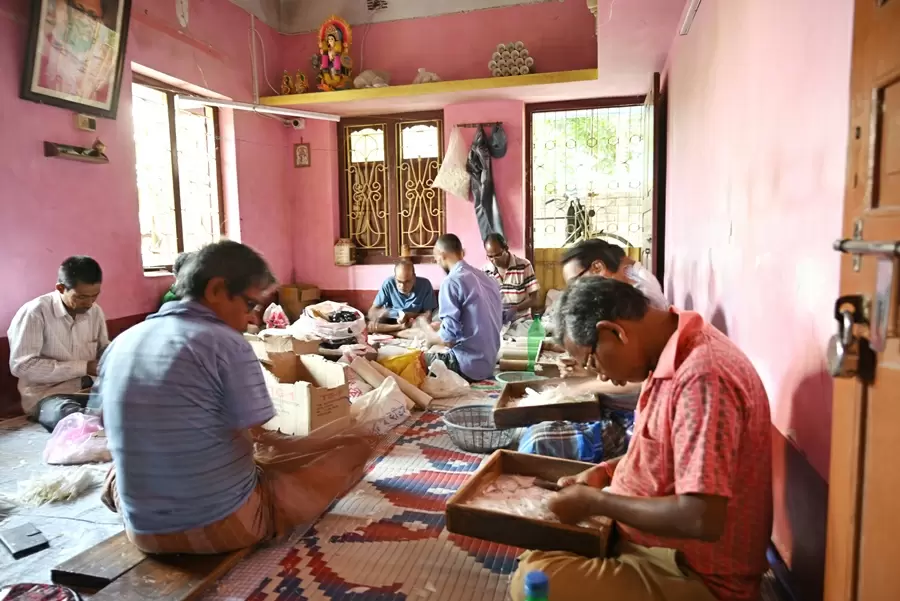
| Adrish ensures every Shuttlex shuttlecock meets the high standards his father once set |
Today, Adrish Maity, armed with modern skills and respect for traditional craftsmanship, is doing his part to keep the legacy alive. With his mother Krishna supervising packing and his younger brother Aniket working at TCS, it remains a family effort.
Through quiet perseverance and a vision for the future, Adrish is ensuring that his father’s dream doesn’t end with him, but takes flight like the very shuttlecocks he crafts, soaring higher each day. -©TWL














